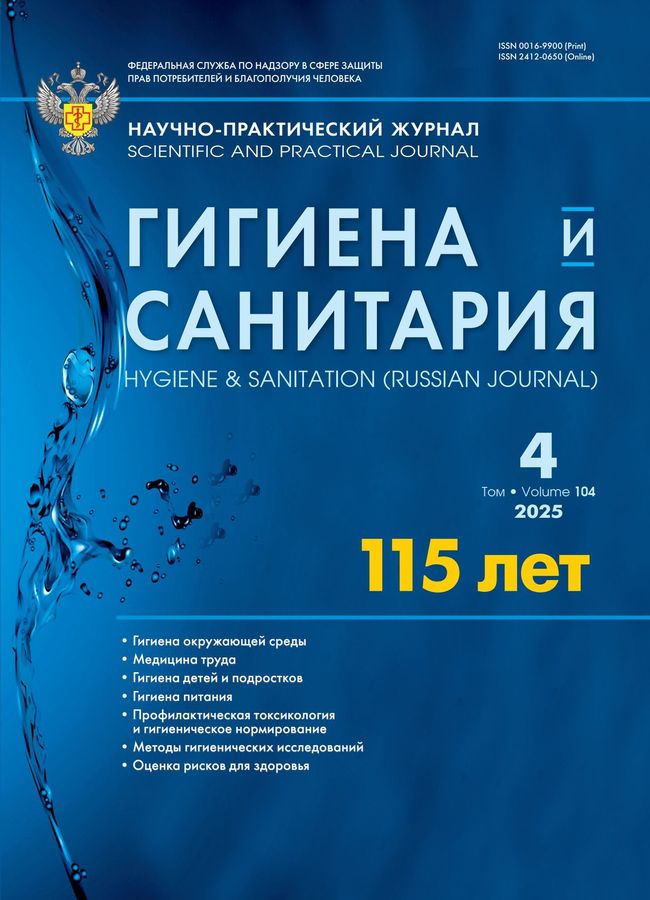Assessment of the risk to public health from exposure to chemicals contained in the water of the centralized water supply system of an industrial city
- Autores: Surzhikov D.V.1, Kislitsyna V.V.1, Golikov R.A.1, Likontseva Y.S.1, Toropchin M.A.2
-
Afiliações:
- Research Institute for Complex Problems of Hygiene and Occupational Diseases
- Branch of the Center for Hygiene and Epidemiology in the Kemerovo Region – Kuzbass in the city of Novokuznetsk and Novokuznetsk District
- Edição: Volume 104, Nº 4 (2025)
- Páginas: 524-530
- Seção: HEALTH RISK ASSESSMENT
- ##submission.datePublished##: 15.12.2025
- URL: https://vestnik.nvsu.ru/0016-9900/article/view/680607
- DOI: https://doi.org/10.47470/0016-9900-2025-104-4-524-530
- EDN: https://elibrary.ru/jluipy
- ID: 680607
Citar
Texto integral
Resumo
Palavras-chave
Sobre autores
Dmitry Surzhikov
Research Institute for Complex Problems of Hygiene and Occupational Diseases
Email: ecologia_nie@mail.ru
Vera Kislitsyna
Research Institute for Complex Problems of Hygiene and Occupational Diseases
Email: ecologia_nie@mail.ru
Roman Golikov
Research Institute for Complex Problems of Hygiene and Occupational Diseases
Email: ecologia_nie@mail.ru
Yuliya Likontseva
Research Institute for Complex Problems of Hygiene and Occupational Diseases
Email: ecologia_nie@mail.ru
Mikhail Toropchin
Branch of the Center for Hygiene and Epidemiology in the Kemerovo Region – Kuzbass in the city of Novokuznetsk and Novokuznetsk District
Email: ffguz-novko@yandex.ru
Bibliografia
- Слесарев В.И. Вода – вещество с уникальными свойствами. Гигиена и санитария. 2021; 101(1): 19–24. https://doi.org/10.47470/0016-9900-2021-100-1-19-24 https://elibrary.ru/fuyeyi
- Рахманин Ю.А., Онищенко Г.Г. Гигиеническая оценка питьевого водообеспечения населения Российской Федерации: проблемы и пути рационального их решения. Гигиена и санитария. 2022; 101(10): 1158–66. https://doi.org/10.47470/0016-9900-2022-101-10-1158-1166 https://elibrary.ru/hkiarc
- Рахманин Ю.А., Розенталь О.М. О повышении достоверности гигиенической оценки качества воды природных источников питьевого водоснабжения. Гигиена и санитария. 2021; 100(11): 1198–202. https://doi.org/10.47470/0016-9900-2021-100-11-1198-1202 https://elibrary.ru/pncrnu
- Марченко Б.И., Журавлев П.В., Плуготаренко Н.К., Юхно А.И. Оценка канцерогенного риска от воздействия хлорорганических соединений в воде систем централизованного водоснабжения. Гигиена и санитария. 2021; 100(2): 99–110. https://doi.org/10.47470/0016-9900-2021-100-2-99-110 https://elibrary.ru/hwwwlf
- Хасанова А.А., Четверкина К.В., Маркович Н.И. Определение приоритетных химических веществ для контроля безопасности воды централизованных сетей водоснабжения. Гигиена и санитария. 2021; 100(5): 428–35. https://doi.org/10.47470/0016-9900-2021-100-5-428-435 https://elibrary.ru/qntdam
- Сазонова О.В., Сергеев А.К., Чупахина Л.В., Рязанова Т.К., Судакова Т.В. Анализ риска здоровью населения, обусловленного загрязнением питьевой воды (опыт Самарской области). Анализ риска здоровью. 2021; (2): 41–51. https://doi.org/10.21668/health.risk/2021.2.04 https://elibrary.ru/efwwcd
- Министерство природных ресурсов и экологии Кузбасса. Доклад о состоянии и охране окружающей среды Кемеровской области – Кузбасса в 2023 году; 2024. Доступно: https://ecokem.ru/wp-content/uploads/2024/07/doklad_2023.pdf
- Новокузнецкий водоканал. Производственный цикл водоснабжения и водоотведения. Доступно: https://vdk.ru/about/proizvodstvennyy_tsikl_viv/
- Кряжев Д.А., Красиков С.И., Карманова Д.С., Боева Т.В., Боев В.М. Гигиеническая оценка риска развития эндокринных нарушений, ассоциированных с загрязнением питьевой воды хлорорганическими соединениями. Гигиена и санитария. 2022; 101(3): 255–61. https://doi.org/10.47470/0016-9900-2022-101-3-255-261 https://elibrary.ru/yzlolf
- Новикова Ю.А., Мясников И.О., Ковшов А.А., Тихонова Н.А., Башкетова Н.С. Методические подходы к организации программ мониторинга качества питьевой воды. Здоровье населения и среда обитания – ЗНиСО. 2020; (10): 4–8. https://doi.org/10.35627/2219-5238/2020-331-10-4-8 https://elibrary.ru/bgoqun
- Новикова Ю.А., Фридман К.Б., Федоров В.Н., Ковшов А.А., Тихонова Н.А., Мясников И.О. К вопросу оценки качества питьевой воды систем централизованного водоснабжения в современных условиях. Гигиена и санитария. 2020; 99(6): 563–8. https://doi.org/10.47470/0016-9900-2020-99-6-563-568 https://elibrary.ru/ilfwus
- Горбанев С.А., Мясников И.О., Новикова Ю.А., Тихонова Н.А. Совершенствование системы управления качеством питьевой воды при реализации федерального проекта «Чистая вода». Гигиена и санитария. 2022; 101(10): 1167–73. https://doi.org/10.47470/0016-9900-2022-101-10-1167-1173 https://elibrary.ru/hvlwhp
- Государственный доклад «О состоянии санитарно-эпидемиологического благополучия населения в Кемеровской области – Кузбассе в 2023 году»; 2024. Доступно: https://42.rospotrebnadzor.ru/upload/iblock/c6c/c6c9b8324091655d1ac7f710c27b9f19.pdf
- Новикова Ю.А., Тихонова Н.А., Мясников И.О., Овчинникова Е.Л., Колчин А.С., Черкашина М.Н. и др. Интегральная оценка качества питьевой воды Омской области. Гигиена и санитария. 2022; 101(8): 861–5. https://doi.org/10.47470/0016-9900-2022-101-8-861-865 https://elibrary.ru/bsivky
- Рахматуллина Л.Р., Сулейманов Р.А., Валеев Т.К., Бактыбаева З.Б., Рахматуллин Н.Р. Оценка риска здоровью населения, связанного с качеством питьевой воды (на примере нефтяных районов Рес-публики Башкортостан). Анализ риска здоровью. 2021; (2): 33–40. https://doi.org/10.21668/health.risk/2021.2.03 https://elibrary.ru/rhccnx
- Ковшов А.А., Новикова Ю.А., Федоров В.Н., Тихонова Н.А. Оценка рисков нарушений здоровья, связанных с качеством питьевой воды, в городских округах Арктической зоны Российской Федерации. Вестник Уральской медицинской академической науки. 2019; 16(2): 215–22. https://elibrary.ru/qblrbz
- Жолдакова З.И., Синицына О.О., Мамонов Р.А., Лебедь-Шарлевич Я.И., Печникова И.А. Совершенствование требований к контролю за применением хлорсодержащих веществ. обеззараживания воды. Здоровье населения и среда обитания – ЗНиСО. 2019; (12): 30–5. https://doi.org/10.35627/2219-5238/2019-321-12-30-35 https://elibrary.ru/ovbygj
- Кирпиченкова Е.В., Джикия И.З., Колодина Д.В., Онищенко Г.Г. Гигиеническая эффективность ультрафиолетового обеззараживания воды в централизованных системах питьевого и хозяйственно-бытового водоснабжения (систематический обзор). Гигиена и санитария. 2024; 103(2): 104–12. https://doi.org/10.47470/0016-9900-2024-103-2-104-112 https://elibrary.ru/lfhhjm
- Алексеева А.В., Савостикова О.Н. Вопросы использования современных органических реагентов в практике питьевого водоснабжения (обзор литературы). Гигиена и санитария. 2023; 102(10): 1029–34. https://doi.org/10.47470/0016-9900-2023-102-10-1029-1034 https://elibrary.ru/ciycok
- Зайцева Н.В., Онищенко Г.Г., Май И.В., Шур П.З. Развитие методологии анализа риска здоровью в задачах государственного управления санитарно-эпидемиологическим благополучием населения. Анализ риска здоровью. 2022; (3): 4–20. https://doi.org/10.21668/health.risk/2022.3.01 https://elibrary.ru/imrune
- Клейн С.В., Вековшинина С.А. Приоритетные факторы риска питьевой воды систем централизованного питьевого водоснабжения, формирующие негативные тенденции в состоянии здоровья населения. Анализ риска здоровью. 2020; (3): 49–60. https://doi.org/10.21668/health.risk/2020.3.06 https://elibrary.ru/tkvfdn
- Фридман К.Б., Новикова Ю.А., Белкин А.С. Оценка риска для здоровья в целях гигиенической характеристики систем водоснабжения. Гигиена и санитария. 2017; 96(7): 686–9. https://elibrary.ru/zfbyzj
Arquivos suplementares








